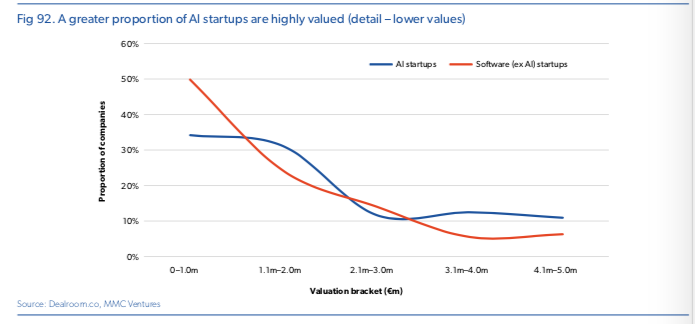One advantage of doing a bit of travelling it that it can allow you to catch up on your reading. On Thursday and Friday last week I travelled on five different trains (plus the tube), and I got a chance to read the MMC Ventures report on artificial intelligence, The State of AI: Divergence.
The headlines that this created were rather dramatic. CNBC screamed: 40% of A.I. start-ups in Europe have almost nothing to do with A.I., research finds. Actually I couldn’t find this in the report, but there were lots of other good things in there.
AI is currently one of the hot sectors for investment, so getting a report of substance is very helpful. I’ll skip over much of the technical notes, other than to satisfy my pedantry 🙂 Much of what is working now is machine learning and its subset, deep learning. All machine learning is AI, but there are (potentially?) many other forms. For the paranoid, machine learning is not enough for computers to become our overlords, though if used badly it could kill a few of us.
Futurology is hard
Those of us who have one eye on predicting the future are particularly interested in the “why now”. Most of us would identify the increase in processing power, particularly that of GPUs, as very relevant. However, MMC identify seven factors that needed to come together to make machine learning a technology that can now be applied for real. Some of this is theoretical, with the development of new algorithms. Also listed are the availability of sufficient training data and cloud services to access this. A couple of factors, such as greater investment and increased interest appear more ephemeral and, to me, seem predicated on the other factors working.
For those of us who have to give some idea of how the future will develop, this illustrates the challenge. Predicting a couple of these is easy. Processing power is always increasing (Moore’s Law). The growth in the amount of data is also clear, though suitability was perhaps less so. The others are perhaps only clear with hindsight.
There also seems to have been a quick tipping point. It seems we have gone from algorithms that could only sometimes pick out an image of a dog to high reliability in next to no time. This may be why, as the report highlights, AI adoption has tripled in 12 months.
What does this mean for investors?
As mentioned before, AI is a hot area. MMC identify over 1600 early stage or startup AI companies in Europe. With 479, the UK has the largest number, which is great for (S)EIS investors. While 87% are focussed on B2B, the proportion of B2C seems to be increasing.
I found the sector split particularly interesting (pg 109). While health and finance are the two biggest areas of interest (39% in aggregate), MMC believe other areas may be more attractive in the near future. For example, manufacturing systems may supply better data for training and may be under-served. Investors could perhaps be better off looking away from the fashionable sectors.
The other fascinating area was that on fundraising and pricing. The report suggests that AI companies may need more financing and longer development times. A shortage of skilled staff contributes significantly the former. The latter seems to me to be likely to improve over time: we are still at the early stages of machine learning deployment and processes & technology will improve further.
Valuations

It is not surprising that AI companies have commanded premium valuations. This is common in any hot area, and the report suggests that until recently the average premium was 20%. More interestingly, it also suggests that this has started to come down. Its not clear if this is the bubble bursting or the investment market reaching saturation.
Interestingly, the report has a section highlighting the potential issues AI brings, such as replicating cultural biases or autonomous killing machines. This includes areas where the technology does not (yet?) live up to the hype. I do wonder if this is part of the bubble bursting. People do get over-excited at new technologies – just look at the tech bubble twenty years ago. While AI will be incredibly useful, it still has limitations. Unlike some other technologies, these will probably reduce over time but maybe we are seeing some realism about where we are now.
Overall I found this to be an excellent report by MMC. Its great to see EIS managers being thought leaders in such a high profile area.